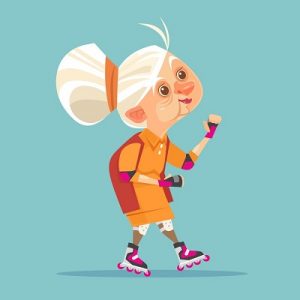 For many years, the foundation of youth myth has kept many people looking for a simple way to keep from being frail. There have been people who have tried cosmetic surgery, special water, and pills to keep from being frail. What they don’t realize is that the foundation of youth is filled with the sweat of a great exercise routine.
For many years, the foundation of youth myth has kept many people looking for a simple way to keep from being frail. There have been people who have tried cosmetic surgery, special water, and pills to keep from being frail. What they don’t realize is that the foundation of youth is filled with the sweat of a great exercise routine.
How Exercise Prevents Frailty
Is it the lifestyle you lead or the number of years you’ve been alive that determines your fitness level during your elderly years? A study by two colleges in England seemed to show that age is just a number, according to the New York Times.
A research study asked the question, “Does aging cause your lifestyle to become sedentary or does a sedentary lifestyle result in aging.” To have an answer to this question, the study looked at a sample of elderly men and women who bicycled regularly and could meet certain criteria to find out how they did on certain tests when compared to those who were not as old.
One of the tests in the study, called the “Timed Up and Go”, measured how long it takes for a person to get up from a chair without their arms, walk fast about ten feet, and return to the chair in order to sit down. Seniors that are active did better than their peers that were sedentary.
The Results of the Studies
While there seems to be a decrease in the muscle mass (strength) and aerobic exercise (endurance) as we age, there are many other factors that are not directly related to the number of years we spend on earth.
As an example, the elderly participants were indistinguishable from the younger participants with regard to memory ability, metabolic health, reflexes, and balance. They were completely indistinguishable. In other words, if a doctor had only the results on paper, it would be impossible to tell if exercise prevents frailty.
What Exercise Does to Prevent Frailty
When you think of people who seem frail, what comes to your mind? Most people envision difficulty moving, a cabinet full of old prescriptions, and forgetfulness. Exercise addresses each of these concerns.
Exercise helps to lower cholesterol, which prevents the chances of getting heart disease and stroke. It enhances your circulation, which gives your body more oxygen and improves circulation. This helps maintain reflexes and balance, which means that elderly people are less likely to need assistance or to fall.
If you have as your goal in the later years of your life to continue checking items off your bucket list, to live independently, and to be healthy, you need to get in the habit of exercising on a regular basis now. It isn’t too late to enjoy the benefits of working out regularly.
Keep your hand raised if you would like to age successfully without acquiring a chronic disease, suffering diminished mobility, gaining a few pounds, or losing precious memory. With getting older, the most effective defense is having a good offense. If the latest research is to be believed, the most effective way to prevent aging is to exercise.
Recognizing the impact of exercise on aging cells is the first step to understanding how exercise prevents frailty. A study published out of the Archives of Internal Medicine in January 2008 confirmed that there is a beneficial impact of exercise at the level of the cells.
The London-based research study was founded on the observation that telomeres, which are regions of the DNA at the end of the DNA fragments in the white blood cells, shorten and erode in the process of aging. This means that their quality and length are biological indicators of the human aging process and are kind of like an internal lifeline. Scientists compared the quality and quantity of the DNA during the process of aging.
The scientists compared the quality and length of the telomeres in more than a thousand sets of twins. Within each set of twins, one twin exercised on a regular basis and the other was sedentary.
They found that the longer and healthier telomeres of the active twin showed no interaction between the two. The younger the biological age, sometimes by as much as 9 years, the more that exercise prevented frailty.






